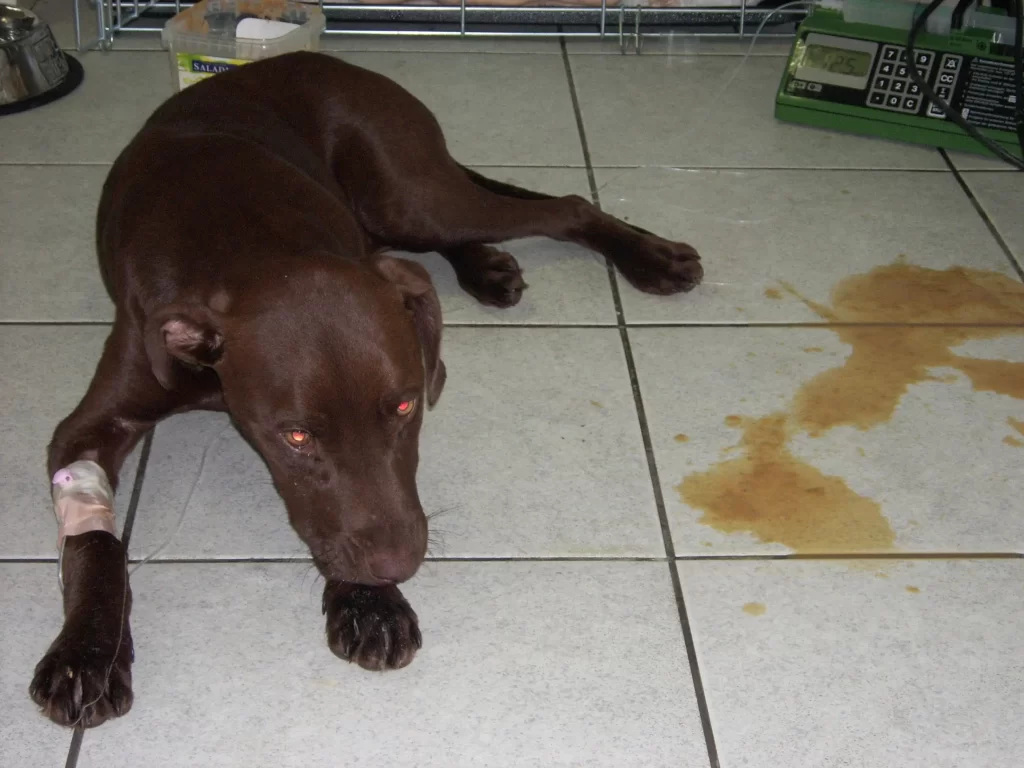
Vomiting in dogs is one of the most common health issues that pet owners may face. It’s often an alarming experience to see your furry friend throwing up, but it’s important to remember that vomiting can occur for various reasons—some of which are harmless, while others may require immediate veterinary attention. In this article, we’ll explore the causes of vomiting in dogs, the symptoms to watch for, how to handle the situation, and how to prevent it from happening in the future.
Understanding vomiting in dogs and being able to differentiate between a mild upset stomach and something more serious is essential for every responsible pet owner. Let’s dive deeper into this topic to help you become better equipped to care for your dog in times of need.
What Is Vomiting in Dogs?
Vomiting in dogs is the active expulsion of stomach contents through the mouth, typically caused by a contraction of the stomach muscles. It is different from regurgitation, which is a passive action where the food or liquid comes back up without the forceful contraction seen in vomiting. Vomiting is often associated with nausea and may come with other signs like excessive drooling, lip licking, and pacing.
Occasional vomiting may not be a cause for alarm, but persistent or severe vomiting should never be ignored. Repeated vomiting can quickly lead to dehydration and nutritional deficiencies, especially if it occurs over an extended period. While most dogs will vomit from time to time, understanding when vomiting is a sign of something more serious is crucial.
Symptoms of Vomiting in Dogs

The symptoms of vomiting in dogs can range from mild to severe, and they can give you valuable insight into the underlying cause. Some dogs may exhibit only the act of vomiting, while others may show additional signs that indicate a more complex issue. Common symptoms include:
- Nausea: Dogs that are feeling nauseous may start salivating excessively, licking their lips, or pacing. They may also seem less energetic than usual.
- Repeated Vomiting: If your dog vomits more than once or twice in a short period, it’s a sign that something more serious may be going on.
- Loss of Appetite: A dog that’s unwilling to eat or drink after vomiting could be feeling unwell or in pain. This can also signal a more serious condition.
- Diarrhea or Constipation: Vomiting can often be accompanied by changes in bowel movements, which may point to gastrointestinal issues, infections, or other health problems.
- Lethargy: Dogs suffering from prolonged vomiting or discomfort may seem unusually tired, weak, or listless.
- Abdominal Pain: If your dog reacts negatively when you touch their belly or seems uncomfortable, it could indicate abdominal pain, which could be a symptom of conditions like pancreatitis or gastric torsion.
My Dog Is Vomiting. What Should I Do?
If you notice your dog vomiting, the first step is to assess the situation carefully. Most of the time, vomiting will not be an emergency, but it’s always important to keep a close watch on your dog for any worsening symptoms. Here’s what you should do:
- Stay Calm and Observe: If your dog vomits once and seems fine afterward, there’s usually no need for immediate concern. Observe their behavior closely to see if they show any additional symptoms like lethargy, loss of appetite, or discomfort.
- Withhold Food for 12-24 Hours: Giving your dog’s stomach some time to rest can help it recover. If they’re vomiting, it’s best to withhold food for 12 to 24 hours (but make sure your dog continues to drink water to stay hydrated). Fasting allows the stomach to settle and recover from the irritation that caused the vomiting.
- Offer Small Amounts of Water: Dehydration can quickly become a concern with vomiting. After withholding food, offer your dog small amounts of water every hour. If they keep it down without vomiting again, you can slowly reintroduce food.
- Reintroduce Food Slowly: Once the vomiting has stopped for at least 12-24 hours, offer a bland diet consisting of boiled chicken (no seasoning) and plain white rice. Gradually reintroduce your dog’s regular food, increasing the portion size over several days.
- Contact Your Veterinarian: If vomiting continues, becomes more frequent, or if your dog shows other concerning symptoms like lethargy, pain, or blood in the vomit, contact your veterinarian immediately. Persistent vomiting can be a sign of serious underlying issues such as poisoning, infection, or gastrointestinal problems.
Causes of Vomiting in Dogs
Vomiting in dogs can occur due to a wide range of causes. Some of these causes are relatively harmless and may resolve with minor intervention, while others may require medical treatment. Here are some of the most common causes of vomiting in dogs:
- Dietary Indiscretion: Dogs love to explore their environment with their mouths, and they may eat things they shouldn’t. Consuming spoiled food, garbage, non-food items, or even certain human foods can irritate the stomach and lead to vomiting. Chocolate, grapes, onions, and xylitol (a sugar substitute) are all particularly toxic to dogs.
- Infections: Various types of infections can cause vomiting, including bacterial infections (such as Salmonella), viral infections (like parvovirus or distemper), and parasitic infections (such as giardia or hookworms).
- Food Allergies or Sensitivities: Some dogs may develop food allergies or sensitivities that lead to digestive upset and vomiting. This could be due to ingredients like beef, chicken, or grains in their food.
- Motion Sickness: Just like humans, some dogs get motion sickness during car rides. If your dog vomits during travel, they may be suffering from motion sickness.
- Toxins or Poisons: Dogs are naturally curious and may ingest toxic substances, such as household chemicals, plants, medications, or spoiled food. Poisoning is a serious cause of vomiting and requires immediate veterinary attention.
- Gastric Torsion (Bloat): This is a life-threatening emergency in which the stomach twists and fills with gas, causing pain, vomiting, and often a rapid heartbeat. Gastric torsion requires immediate surgery to correct and prevent death.
- Chronic Health Conditions: Some long-term conditions, such as liver disease, kidney disease, pancreatitis, or cancer, can lead to recurrent vomiting. These conditions often require ongoing veterinary care.
How Veterinarians Diagnose Vomiting in Dogs
If your dog’s vomiting persists or worsens, it’s essential to take them to the veterinarian for a proper diagnosis. Your veterinarian will start with a physical examination and ask questions about your dog’s symptoms, diet, and behavior. Diagnostic tests may include:
- Blood Tests: Blood work can help detect infections, liver or kidney function issues, pancreatitis, or other internal problems that might be causing vomiting.
- X-Rays or Ultrasound: Imaging tests help the veterinarian look for foreign objects, tumors, or structural problems like gastric torsion. These tests are crucial in detecting physical obstructions or abnormalities.
- Fecal Tests: If parasites are suspected, your vet will likely take a stool sample to check for intestinal worms or other gastrointestinal parasites.
- Urinalysis: Testing urine can help assess kidney function, dehydration, and other possible issues contributing to vomiting.
- Endoscopy or Biopsy: In some cases, your veterinarian may recommend an endoscopy (a camera inserted into the digestive tract) or biopsy to investigate the stomach lining for inflammation, infection, or cancer.
Treatment of Vomiting in Dogs

The treatment for vomiting in dogs largely depends on the underlying cause. Some of the common treatments include:
- Fluids: If your dog is dehydrated, your vet may administer intravenous (IV) fluids to rehydrate them. Dehydration can be life-threatening if left untreated, especially with ongoing vomiting.
- Medications: Anti-nausea medications, such as maropitant (Cerenia), may be prescribed to help reduce vomiting. Antibiotics or antiparasitic drugs might also be given if an infection or parasite is the cause.
- Dietary Adjustments: If food allergies or sensitivities are suspected, your vet may recommend a special diet or food trial to identify the trigger. A bland diet like boiled chicken and rice can help soothe the stomach during recovery.
- Surgery: In cases of foreign object ingestion or gastric torsion, surgery may be necessary to remove the object or correct the stomach’s position.
Recovery and Management of Vomiting in Dogs
Once the underlying cause of your dog’s vomiting has been addressed, it’s essential to focus on their recovery:
- Gradual Reintroduction of Food: After a period of fasting, slowly reintroduce your dog’s regular food, starting with small, frequent meals to avoid overwhelming the stomach.
- Monitor for Recurrence: Keep a close watch on your dog’s condition. If vomiting resumes, consult your veterinarian for further evaluation.
- Follow-Up Vet Visits: If your dog had a serious condition like pancreatitis or infection, follow-up appointments with your vet are important for monitoring their health and preventing relapse.
Prevention of Vomiting in Dogs
While it’s not always possible to prevent vomiting, there are several strategies that can help minimize the risk:
- Avoid Toxic Foods and Substances: Keep harmful foods (like chocolate, grapes, onions, and alcohol) and household chemicals out of your dog’s reach.
- Prevent Overeating or Eating Too Quickly: Consider using slow-feed bowls or puzzle feeders to prevent your dog from eating too fast, which can lead to vomiting.
- Regular Vet Check-Ups: Routine check-ups can help catch underlying health problems early and keep your dog in good overall health.
- Limit Travel for Motion-Sick Dogs: If your dog suffers from motion sickness, try limiting travel or consult your vet for anti-nausea medications.
- Proper Diet: Feed your dog a balanced diet that is appropriate for their age, size, and health condition.
Vomiting in dogs can be distressing, but with the right knowledge and proactive care, most cases can be managed effectively. Whether it’s due to a simple upset stomach or a more serious medical condition, understanding the cause and getting the right treatment is key to your dog’s recovery. If your dog is vomiting persistently, always reach out to your veterinarian for guidance. With prompt attention and proper care, you can ensure that your dog remains happy, healthy, and comfortable.





